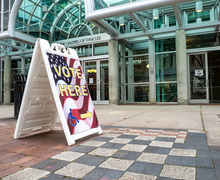Report of TSA behavior shows racist tendencies
/ The Daily Orange
The Transportation Security Administration’s attempt to observe airline passengers’ behaviors while going through airport security was revealed to be a cause for racial profiling this week.
TSA officers at Logan Airport in Boston told the New York Times the program has increasingly targeted minorities to search instead of actual passengers who pose a threat. Racial profiling is not a solution to the security threat the United States faces.
A security officer at the airport told the Times, “They just pull aside anyone who they don’t like the way they look — if they are black and have expensive clothes or jewelry, or if they are Hispanic.”
This is not what the intended goal of the program was.
The program was launched in 2011 as a trial, though behavior detection has been used at Logan since 2003. TSA officers were supposed to have a “casual conversation” with passengers after providing a boarding pass and ID, according to TSA spokesman Greg Soule in the Times article.
At the start of the program, Soule said, “Officers are specifically trained to keep questions purposeful and related to detecting a passenger’s intent. This program is in no way related to passengers’ race or ethnicity.” What was found at Logan suggests the program has not been about passengers’ behavior but their race.
Some think we need to profile. Supporters of racial profiling proclaim we shouldn’t sacrifice our security for political correctness. Because the 9/11 hijackers looked Middle Eastern, we need to heavily screen those who look similar. Law enforcement officers’ instincts should be pursued so we can be safer.
Not all terrorists who attack the United States have been Muslim or even look Middle Eastern. White and nonwhite individuals have committed acts of terrorism on U.S. soil. All individuals should be equally, fairly scrutinized at airport security because anyone could pose a threat — no matter his or her race.
Trying to more heavily screen people who look Arabic is not only a poor response to the actual threat posed, but it may do further damage to the ability of law enforcement to protect us from actual threats. We risk alienating the people we need to help us.
There is already a culture of suspicion of Middle Easterners and Muslims caused by the way law enforcement behaves. Earlier this year, the New York Police Department was found to be spying on Muslim student associations in U.S. colleges (including Syracuse University) and cataloging mosques in New Jersey. This is one part of the law enforcement system that may not be treating all citizens as equals.
Accounting for other individual characteristics like age may make more sense than racial profiling. A passenger’s age could be more useful than race. The elderly and young children are less likely to pose a threat than others.
We should not have to resort to racial profiling at airports to make us safe. The behavior detection program at Logan is one among more than 100 airports that now use the program. Officers should be trained to ensure race and behavior are not confused. Classifying certain races as more prone to attacking the U.S. is not an answer to the threat we face.
Harmen Rockler is a senior newspaper journalism and political science major. His column appears weekly. He can be reached at horockle@syr.edu.
Published on August 20, 2012 at 2:54 pm





